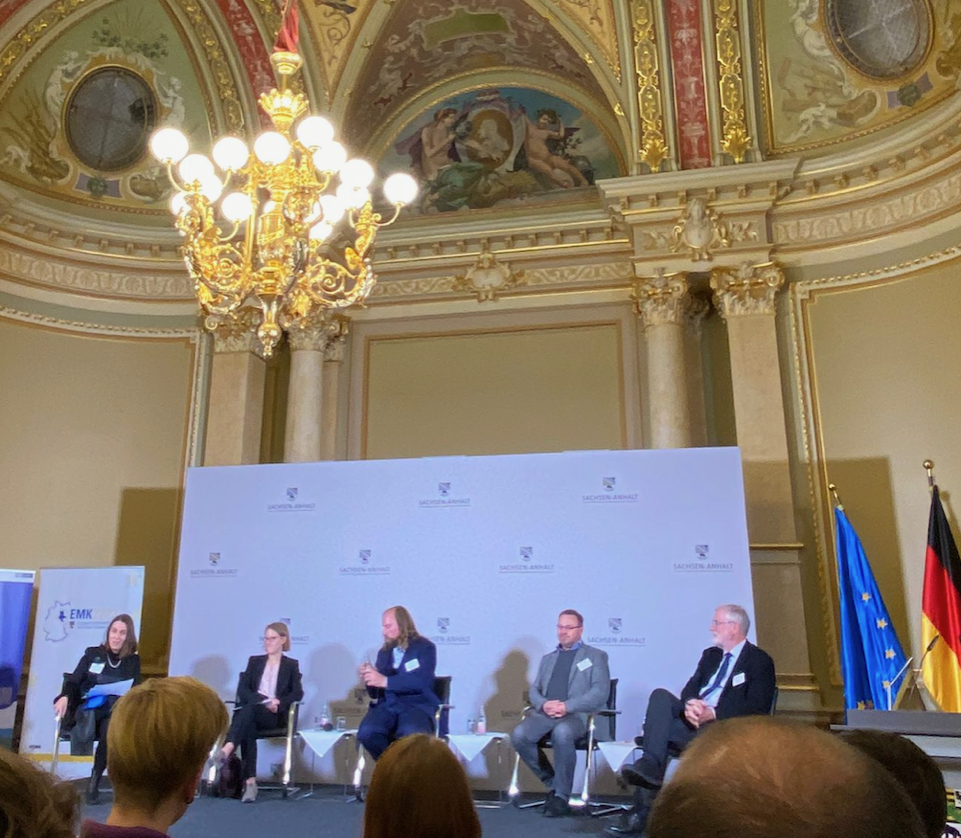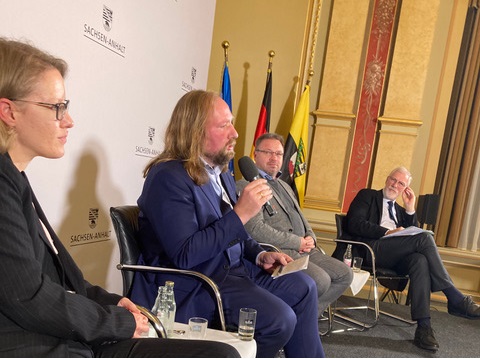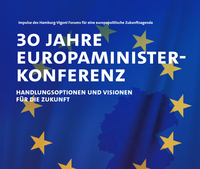Europaforum im Palais 2022
On November 28, 2022, after a two-year break, another edition of the discussion event "Europaforum im Palais" took place under the patronage of the Minister of European Affairs and the Jean Monnet Chair of Prof. Heidbreder from the Otto von Guericke University in Magdeburg. Under the title "Influence EU: Europa gestalten und für Europa begeistern", about 90 participants came together in the ballroom of the Palais of the State Chancellery in Magdeburg following the invitation of Mr. Robra, Minister of Europe in Sachsen-Anhalt.

The topic this year was the 30th anniversary of the European Ministers Conference (EMC) and the current presidency of the state of Saxony-Anhalt, as well as the publication of a study on the EMC, created by a collaboration of the Jean Monnet Chair and the Hamburg-Vigoni Forums. Rainer Robra (EMF Chair and Minister of European Affairs of Saxony-Anhalt), Dr. Anton Hofreiter (Member of the Bundestag and Head of the Committee on European Union Affairs in the Bundestag), Dr. Johanna Schnabel (Research Fellow at the Otto Suhr Institute of the Free University of Berlin) and Maik Reichel (Director of the Landeszentrale für politische Bildung in Saxony-Anhalt) were invited to participate in the panel discussion. Prof. Dr. Eva Heidbreder moderated the discussion on the potentials of shaping European policy in the Land.
After the welcoming words of Minister of European Affairs Robra, the panelists shed light primarily on topics of content-related coordination of European policy in Germany as well as on communication, public relations and policy mediation. Europe Minister Robra highlighted in particular the participation of the Länder through the EMC in all European policy debates and the creation of a common position to strengthen the position of the Länder in European policy issues.
The perspective of the federal government was presented by Dr. Hofreiter and it became clear here as well that the Länder play an important role in the German European policy, especially in areas of exclusive Länder competencies, such as media or education policy. Although there was not always agreement and state and federal politics regularly rubbed shoulders, the chairman of the Bundestag's Committee on European affairs pointed out that the often intense discussions of differing points of view are important and contribute to finding common solutions, and that the Länder play a valuable role as participants in the discourse.
Dr. Schnabel, who contributed to the study, mentioned at the beginning, the function and position of the EMC as an intergovernmental conference in Germany, pointing out that the EMC often goes beyond the topics of specific minister conferences and that the EMC is especially relevant because its provides an overarching perspective. Many of today's challenges can no longer be categorized in a specific policy field and therefore require precisely this overarching view. Finally, Dr. Schnabel explained that the EMC is a voluntary intergovernmental conference, independent of the federal government, which enables the Länder to provide important impulses.
Mr. Reichel spoke of the work of the Landeszentrale für politische Bildung in Saxony-Anhalt in the context of European political communication and the promotion of citizen engagement with European affairs. As one of the most successful projects in recent times, Mr. Reichel mentioned the Europa-Ticket, which enables young people to travel through the EU and received a much larger and more positive response than previously expected.
 The introductory round already showed that four very different perspectives were represented by the panelists during the event. In the further course, a detailed and lively discussion took place on various topics. Among others, the most relevant topics of the German European policy for the Länder were discussed. These included the impact of the various crises of recent years, the increasing importance of identifiable personalities for European political communication (including those in national European politics), and the cooperation and potential lessons learned from the modes of operation and public communication of other intergovernmental conferences.
The introductory round already showed that four very different perspectives were represented by the panelists during the event. In the further course, a detailed and lively discussion took place on various topics. Among others, the most relevant topics of the German European policy for the Länder were discussed. These included the impact of the various crises of recent years, the increasing importance of identifiable personalities for European political communication (including those in national European politics), and the cooperation and potential lessons learned from the modes of operation and public communication of other intergovernmental conferences.
Questions from the audience were discussed in the open-discussion round at the end. Topics such as the reformed voting age for the next European elections, in which for the first time 16-year-old citizens will be able to vote, the decision-making process for a new EU chip law with great relevance for Magdeburg, and in general the question of political engagement and participation were addressed
If your interest has been awakened, you can find the answers to these questions and the full discussion on the Youtube channel of the state of Saxony-Anhalt here.
The event was attended by numerous network partners, students of the Otto von Guericke University Magdeburg and interested citizens. The evaluation of the event by the participants was very positive. More than 50% of the respondents liked the event very much and also more than 50% would like to participate in the Europaforum im Palais in the future.
